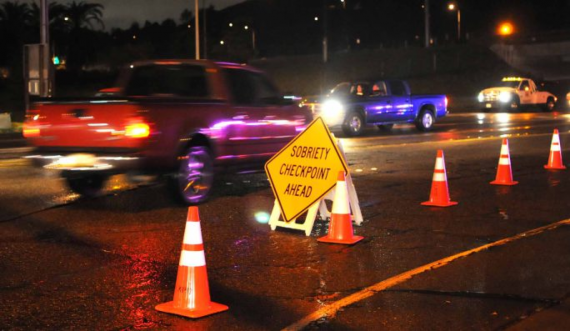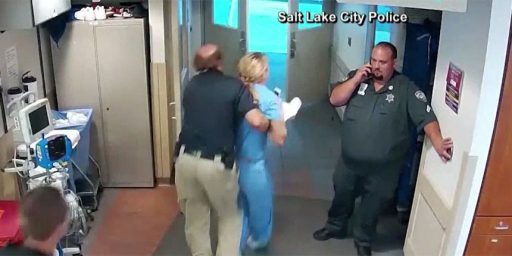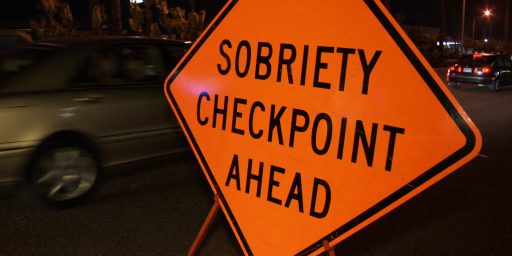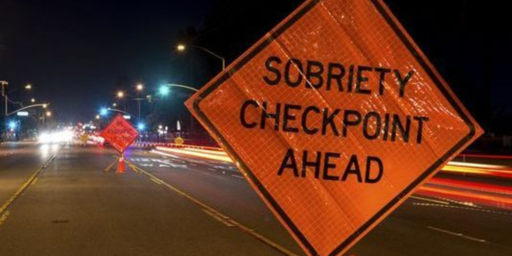SCOTUS Rules DUI Blood Tests Require Search Warrant, But Breath Tests Do Not
The Supreme Court balances the Fourth Amendment against public safety concerns and, for the most part, gets it right.
Earlier this week, the Supreme Court ruled that warrants are required for blood tests in connection with a DUI investigation but that warrantless breath tests are acceptable:
The Supreme Court on Thursday said that police must obtain a warrant before requiring a suspected drunk driver to submit to a blood alcohol test.
In a divided opinion, the court made a distinction between blood tests, which require the piercing of the skin, and breath tests, which it found are not particularly painful, intrusive or embarrassing.
The case arose after several states cracked down on drunk drivers by imposing criminal penalties, in addition to revoking licenses, for those who refuse to undergo testing when stopped by police. The question for the court was whether officers must obtain warrants to perform such tests.
In its opinion, the court tried to find a middle ground in balancing the government’s interest in promoting public safety on roads with individual privacy rights.
“The impact of breath tests on privacy is light, and the need for BAC [blood alcohol content] testing is great,” Justice Samuel A. Alito Jr. wrote for the court’s majority. He was joined by Chief Justice John G. Roberts Jr. and Justices Anthony M. Kennedy, Elena Kagan and Stephen G. Breyer.
In contrast, blood tests are “significantly more intrusive” and do not justify violating Fourth Amendment protections against unreasonable searches. The breath tests, Alito added, are “no more demanding than blowing up a party balloon.”
The court’s decision means that suspected drunk drivers can be arrested for refusing to submit to breath tests, but not for refusing a blood test.
The majority found that states are justified in trying to prevent drunken driving and pointed to statistics that show tougher laws corresponding with a decrease in alcohol-related fatalities from about 25,000 a year in the early 1980s to fewer than 10,000 in 2014. Alcohol consumption, Alito noted, is a leading cause of traffic fatalities and injuries.
During oral arguments in April, the attorney for three drivers from North Dakota and Minnesota said states cannot force people to give up their Fourth Amendment protection against warrantless searches.
Justice Sonia Sotomayor, joined by Justice Ruth Bader Ginsburg, agreed, finding that warrants should be required for both breath and blood testing.
Warrantless searches should be the exception, Sotomayor wrote.
“I fear that if the court continues down this road, the Fourth Amendment’s warrant requirement will become nothing more than a suggestion.”
Sotomayor said that the state’s interest in protecting the public from drunk drivers is accomplished by the arrest itself when the motorist is removed from the road.
But Alito responded that deterring people from getting behind the wheel in the first place with tough criminal penalties is just as important.
“License suspension alone is unlikely to persuade the most dangerous offenders . . . to agree to a test,” he wrote.
Government lawyers told the court during oral argument that judges are not always available to issue warrants and that some jurisdictions are more efficient than others. The majority concluded that the court system would be “swamped” if warrants were also required for breath tests and that local judges would have to be available at all hours of the day, seven days a week.
Sotomayor cast doubt on the amount of time it would take for officers to obtain warrants for breath tests and said such a requirement would only result in judges having to issue a few extra warrants per month.
The tests, she noted, are often conducted at police precincts rather than on the roadside — sometimes 40 minutes to two hours after arrest. That window, she said, could be used to obtain a warrant.
In a separate opinion, Justice Clarence Thomas called any distinction between the two types of tests an “arbitrary line in the sand.” Both tests are constitutional without a warrant, he wrote, in part because of the need for police to act quickly when collecting evidence that dissipates as the body metabolizes alcohol.
The Court’s ruling in this case, which involves a consolidation of three cases from North Dakota and Minnesota, would appear to provide a final answer of sorts to the Fourth Amendment questions that have surrounded stops and arrests for driving under the influence for decades now. As SCOTUSBlog’s Amy Howe notes, in rulings that go back several decades now the Supreme Court has long recognized that testing for blood alcohol content is a search covered by the Fourth Amendment for which a warrant would ordinarily be required. However, there have also been long standing, long recognized exceptions to that rule that allow officers to conduct certain searches provided that certain conditions are met. In the case of persons suspected of driving under the influence, that has included the fact that the law has recognized since at least the Colonial Era that a search conducted incident to a lawful arrest will be considered lawful notwithstanding the lack of a warrant. Additionally, many states have passed so-called ‘implied consent’ laws which state that driving on a public road means that one has given their consent to a DUI-related breath or blood test without police being required to obtain a warrant. In many of these states, a driver who refuses either a breath or blood test can be charged with a separate offense over and above the underlying DUI charge. Typically, a conviction under one of these ‘refusal’ statutes could lead to loss of one’s license to drive for up to a year as well as the potential for jail time and fines separate from any sentence related to the DUI charge. The question that has gone unanswered from the Supreme Court is whether the breath or blood test itself requires a warrant.
As Howe notes, the Court’s opinion makes a distinction between breath and blood tests based on their level of intrusiveness and concludes that blood tests are simply too intrusive to allow them to proceed forward without a warrant:
For breath tests, the Court concluded, the balance weighs in favor of allowing them without a warrant. There is no real physical intrusion on the driver’s body from the breath test, the Court explained. “The effort is no more demanding than blowing up a party balloon.” Breath tests provide police with only one piece of information – the concentration of alcohol in the driver’s breath – and police do not (because of the very nature of breath tests) retain a sample. On the other side of the equation, testing suspected drunk drivers is an important state weapon to fight drunk driving, while requiring a warrant to test every suspected drunk driver would swamp local courts without creating extra benefits – after all, the facts that would provide the kind of probable cause needed for a warrant would be “largely the same from one drunk-driving stop to the next,” as would the tests themselves.
By contrast, the Court concluded today, blood tests do not pass constitutional muster. Although they too play an important role in the war on drunk driving, they are “significantly more intrusive” than breath tests: they require the technician taking the sample to pierce the driver’s skin, extracting a sample that provides law enforcement officials with more information than a breath test, and which they can retain.
Justice Sonia Sotomayor agreed with the majority that the Constitution does not allow blood tests without a warrant, but she would have ruled that the breath tests also require a warrant. In an opinion that was joined by Justice Ruth Bader Ginsburg, Sotomayor acknowledged that states “must have tools to combat drunk driving.” But she saw no reason why requiring a warrant for breath tests would thwart these efforts. Among other things, she noted, there is already a significant lag time between when police make a drunk-driving arrest and when a breath test is administered; police officers could easily seek a warrant during “this built-in window,” she suggested.
Justice Clarence Thomas also parted ways with the majority, but for essentially the opposite reason as Sotomayor: in his view, neither the breath nor the blood test should require a warrant. Alcohol naturally dissipates from the driver’s bloodstream over time, which in his view creates the kind of “exigent circumstances” for which the Supreme Court has carved out another exception to the Fourth Amendment’s general warrant requirement. Therefore, Thomas concluded, once police officers believe that a driver is intoxicated, he reasoned, no warrant is needed to test the concentration of alcohol in his body.
(…)
More broadly, the Court’s ruling upholding breath tests without a warrant likely will take much of the sting out of its ruling against the states on the blood tests, as we can expect to see police officers avoid this problem by resorting to breath tests whenever possible. And with the Court having given a fairly resounding seal of approval to the breath tests, I would also expect to see more states adopt criminal penalties for refusing the breath tests soon.
As a general rule, the Fourth Amendment requires any search by police to be accompanied by a warrant based on probable cause. As I note above, though, the law has long recognized that there are exceptions to that rule that allow for warrantless searches under certain circumstances. With respect to cases where the police have a reasonable suspicion that a driver they have stopped may be driving under the influence of alcohol or some other substance, those exceptions have allowed police to conduct certain roadside sobriety tests to determine the physical condition of the stopped driver. The results of those field tests — which include things like walking in a straight line, balancing on one foot, reciting the alphabet, and conducting a roadside “instant” breath test the results of which are generally not admissible in court — can then be used to aid the officer in determining if there is probable cause that the driver is intoxicated. At that point, the driver can be placed under arrest and taken to a police station where they have been required to undergo either a breath test under controlled conditions or submit to having their blood drawn for a blood test. Now, though, the Court has ruled that if police choose to demand a blood test they will generally have to obtain a search warrant, but that they can continue conducting breath tests without a proper warrant. This is why so many DUI cases that involve use of a breath test end up becoming a trial over the legitimacy of the stop or the question of whether or not there was probable cause for arrest, because a defense attorney who can establish that there was no reasonable suspicion for a stop or not probable cause for an arrest, then the results of the breath test, which have reached the point of acceptability in Court that they are essentially impossible to challenge once they have been admitted into evidence, must be thrown out. In that situation, the prosecution’s case will typically fall apart unless they can establish by other means, such as driving behavior, witness testimony, or admissions from the Defendant, that the defendant was in fact intoxicated while driving.
In this case, the Court makes a distinction for Fourth Amendment purposes between breath and blood tests based on their level of intrusiveness and, like Orin Kerr, I think the Justices in the majority did a pretty good job of answering a hard question. Breath is distinguishable from blood most notable by the fact that human beings exhale on a regular basis. Requiring them to exhale into a tube for a moment is not really a significant intrusion on privacy, and certainly not as intrusive as a blood test. Added into this is the consideration that requiring a warrant for every breath test would impose significant logistical demands on law enforcement and the judicial system that don’t seem to be justified given the minimal intruion on privacy that is involved in a breath test. Additionally, it takes much more time for police to obtain a blood sample and get it to a proper laboratory than it does for them to conduct a breath test in a police station, meaning that there ought to be enough time to find a judge and obtain a warrant for the blood test. In any case, what this means is that in most cases drivers will not have a legitimate basis for refusing to consent to a breath test, but they will have a basis for refusing to submit to a warrantless blood test. As a result of this, one suspects that more states will adopt some version of the the ‘refusal’ statute I mentioned above that covers breath tests, which will obviously give police some leverage over recalcitrant drivers who may be thinking of refusing. They will not, however, be able to apply similar criminal penalties for refusing to submit to a blood test.
Left unanswered by this case are several questions about possible exceptions to the warrant requirement for blood tests. For example, what about situations where it is impossible for police to get a proper breath sample in time, such as when a driver is taken to a hospital due to injuries suffered in an accident. A court may argue that there’s time to obtain a warrant even in this situation, but it could also rule that extigant circumstances allow authorities to obtain a blood test without having to obtain a warrant. These would likely have to be judged on a case by case basis. Another situation still to be addressed in the wake of this opinion is one where the breath test is not an option because the driver is suspected of being intoxicated via a narcotic or other drug rather than alcohol. Since the breath test is pointless in such a situation and the blood test is the only option for obtaining evidence of intoxication, would officers still be required to obtain a warrant for the blood test? I suspect the answer would be yes, but that will have to wait for a future case and a future Supreme Court. For now, though, the practical meaning of this case is that you cannot refuse to take a breath test without facing the possibility of a conviction under a ‘refusal’ statute, but that you can demand a warrant if police want to take a blood sample.
Here’s the opinion:







How about pat downs ?
@Tyrell: Did you really get patted down at a sobriety checkpoint? My guess is that since a pat down is a search, probable cause would be necessary, but IANAL.
Holy crap, he got something right?
OK, I take it back.
@Just ‘nutha ig’rant cracker:
It isn’t. A “Terry stop” only requires “reasonable suspicion”, and can include a brief detention and a pat down.
http://law.justia.com/constitution/us/amendment-04/13-stop-and-frisk.html
In essence, you don’t have many Fourth Amendment rights outside of your home, and you have even fewer while you’re in your car.
About trunk searches: can Homeland Security over rule search warrant rules in case of some suspected bomb or other device ?
In what circumstances can Homeland Security over rule the local police ?
@Tyrell: You should stop asking question like these, Tyrell. You’re going to draw attention to yourself. May I remind you that the NSA didn’t stop sweeping our search histories and conversations online?